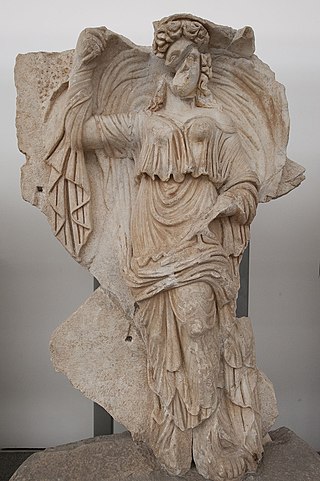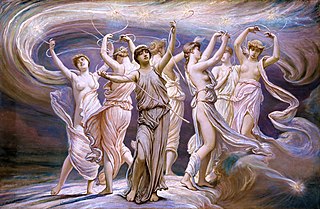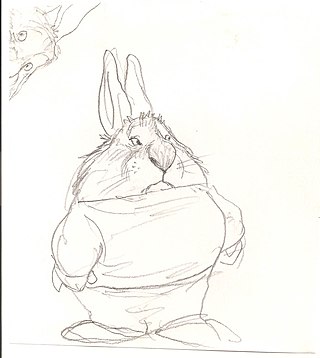Related Research Articles

Metis, in ancient Greek religion and mythology, was the goddess of good counsel and one of the Oceanids, the daughters of the Titans Oceanus and Tethys. She is notable for helping a young Zeus free his siblings from his father Cronus' belly by supplying him with a special drug. After Zeus became king of the cosmos, he and Metis were married, but after hearing a prophecy stating that after Metis gave birth to a daughter, she would have a son mightier than Zeus who would overthrow him, Zeus tricked the still pregnant Metis and swallowed her whole. Metis still managed to bear their daughter Athena, the goddess of wisdom.

In Greek mythology, Phoenix was the son of king Amyntor. Because of a dispute with his father, Phoenix fled to Phthia, where he became king of the Dolopians, and tutor of the young Achilles, whom he accompanied to the Trojan War. After Achilles had in anger withdrawn from the war, Phoenix tried to persuade Achilles to return.

In Greek mythology, Adonis was a mortal lover of the goddess Aphrodite and of Persephone.
In ancient Greek religion and mythology, Adrasteia, also spelled Adrastia, Adrastea, Adrestea, Adastreia or Adrasta), originally a Phrygian mountain goddess, probably associated with Cybele, was later a Cretan nymph, and daughter of Melisseus, who was charged by Rhea with nurturing the infant Zeus in secret, to protect him from his father Cronus. By at latest the fifth century BC, she became identified with Nemesis, the goddess of divine retribution.
In Greek mythology, Adrastus or Adrestus, , was a king of Argos, and leader of the Seven against Thebes. He was the son of the Argive king Talaus, but was forced out of Argos by his dynastic rival Amphiaraus. He fled to Sicyon, where he became king. Later he reconciled with Amphiaraus and returned to Argos as its king.

In Greek mythology, the Oceanids or Oceanides are the nymphs who were the three thousand daughters of the Titans Oceanus and Tethys.
Philyra or Phillyra is the name of three distinct characters in Greek mythology.

In Greek mythology, Hemera was the personification of day. According to Hesiod, she was the daughter of Erebus (Darkness) and Nyx (Night), and the sister of Aether. Though separate entities in Hesiod's Theogony, Hemera and Eos (Dawn) were often identified with each other.
In Ovid's Metamorphoses, Phobetor, so called by men, or Icelos ('Like'), so called by the gods, is one of the thousand sons of Somnus (Sleep). He appeared in dreams "in the form of beast or bird or the long serpent".

In Greek mythology, Hyperion was one of the twelve Titan children of Gaia and Uranus. With his sister, the Titaness Theia, Hyperion fathered Helios, Selene and Eos.

Morpheus is a god associated with sleep and dreams. In Ovid's Metamorphoses he is the son of Somnus and appears in dreams in human form. From the Middle Ages, the name began to stand more generally for the god of dreams, or of sleep.
John Tripp was an Anglo-Welsh poet and short-story writer.

The Pleiades, were the seven sister-nymphs, companions of Artemis, the goddess of the hunt. Together with their seven sisters, the Hyades, they were called the Atlantides, Dodonides, or Nysiades, nursemaids and teachers of the infant Dionysus. The Pleiades were thought to have been translated to the night sky as a cluster of stars, the Pleiades, and were associated with rain.

Clytie, or Clytia is a water nymph, daughter of the Titans Oceanus and Tethys in Greek mythology. She is thus one of the 3,000 Oceanid nymphs, and sister to the 3,000 Potamoi.
The sexuality of Abraham Lincoln, and the possibility of his homosexuality, has been the topic of historical speculation and research. No such discussions have been documented during Lincoln's lifetime, however some authors have recently discussed what they say is evidence that he may not have been exclusively heterosexual. An poem he wrote that referred to a marriage between two men was edited out of later editions of the first Lincoln biography before being reincluded in the 1942 edition. Proponents of the theory that Lincoln was not heterosexual have cited the fact that he shared a bed with Joshua Fry Speed for four years when both were bachelors as evidence. Some historians point to Lincoln having openly alluded to it as showing that men sharing a bed was common and carried no implications in Lincoln's era.

In Greek mythology, Aether, Æther, Aither, or Ether is the personification of the bright upper sky. According to Hesiod, he was the son of Erebus (Darkness) and Nyx (Night), and the brother of Hemera (Day). In Orphic cosmogony Aether was the offspring of Chronos (Time), and the brother of Chaos and Erebus.

The Seven against Thebes were seven champions in Greek mythology who made war on Thebes. They were chosen by Adrastus, the king of Argos, to be the captains of an Argive army whose purpose was to restore Oedipus' son Polynices to the Theban throne. Adrastus, although always the leader of the expedition against Thebes, was not always counted as one of the Seven champions. Usually the Seven were Polynices, Tydeus, Amphiaraus, Capaneus, Parthenopaeus, Hippomedon, and Adrastus or Eteoclus, whenever Adrastus is excluded. They tried and failed to take Thebes, and all but Adrastus died in the attempt.

Wallace Whitney Tripp was an American illustrator, anthologist and author. He was known for creating anthropomorphic animal characters of emotional complexity and for his great visual and verbal humor. He was one of several illustrators of the Amelia Bedelia series of children's stories. He has illustrated over 40 books, including Marguerite, Go Wash Your Feet (1985), Wallace Tripp's Wurst Seller (1981), Casey at the Bat (1978) and A Great Big Ugly Man Came Up and Tied His Horse to Me (1973). Tripp also drew many greeting cards for the Pawprints line.

In Greek mythology, Chione was the daughter of Boreas, the god of the north wind, and Orithyia a daughter of Erechtheus, king of Athens.
In Greek mythology, Melia was an Oceanid, one of the 3,000 water nymph daughters of the Titans Oceanus and his sister-spouse Tethys. She was the mother of culture hero Phoroneus, and Aegialeus, by her brother Inachus, the river-god of Argos. However, in some accounts, Inachus fathered Phoroneus by an Oceanid nymph named Argia. According to Argive tradition, Phoroneus was the first man, or first inhabitant of Argos, who lived during the time of the Great Flood, associated with Deucalion.
References
- ↑ Tripp,158
Bibliography
- Tripp, Edward (1974) The Meridian Handbook of Classical Mythology New York, Penguin Group ISBN 978-0-452-00927-1
